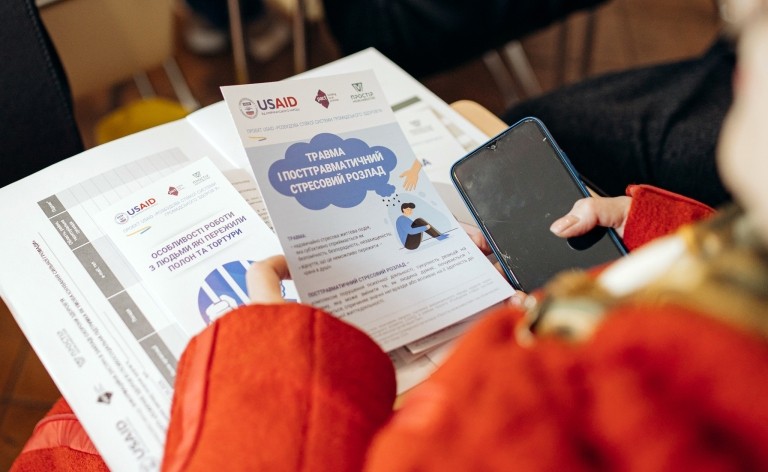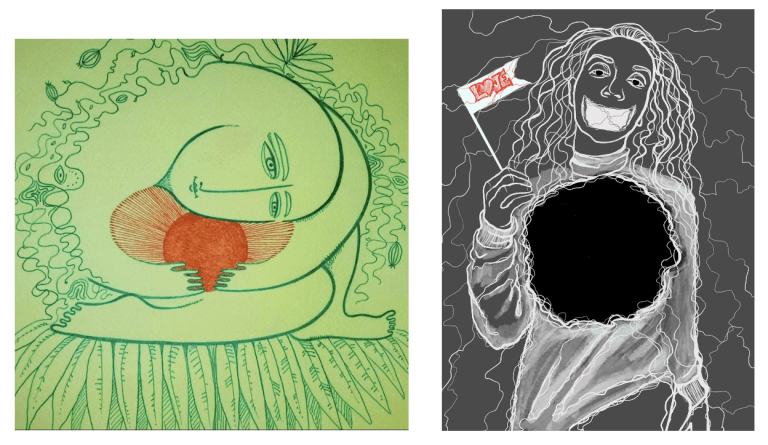Feature
Trauma therapy helps a mother in Ukraine regain mental health amid war

Iryna, a 36-year-old artist, shares two pieces of art to explain the way the war in Ukraine changed her. The first is filled with color and hope.
"It is from the time when I was happy, living in peaceful Ukraine, and everything was fine. This was my moral (mental) state,” she says.
“The second one, the black one, is my state of mind after the war started."
Iryna, who asked that her name be changed for this article, lived in Zaporizhzhia region before the war and had taught art for most of her adult life.
"My dream is to return to my hometown and paint it with patriotic murals,” she says now. “I've seen it abroad. It looks very chic. And I could do it."

Life turned out so that at the time of Russia's full-scale invasion of Ukraine, Iryna was serving in the Ukrainian armed forces as an assistant cook. She was on a military mission in Mariupol, where fierce fighting began. She had to live through the horrors of war, the fear of losing loved ones who were under occupation, and being separated from her child. Iryna resigned from the army and went abroad with her son. She eventually returned to Ukraine, to Ivano-Frankivsk.
Iryna recalls that the manifestations of PTSD and depression began while she was abroad: "The depression was very strong. I didn't want to live. The only thing that saved me was that I was a mother. I had a child, and I couldn't afford not to live. I wasn't interested in anything else. I was not interested in eating, sleeping, walking. Even the sounds of cars on the street reminded me of war. I wanted to fall asleep and not wake up."
In Ivano-Frankivsk, Iryna sought professional psychological help. Her friends advised her to contact the Integration Center for Mental Health and Trauma Therapy, supported by the Pact-led, USAID-funded Public Health System Recovery and Resilience Activity, or PHS R&R.
"Sessions with the psychologist, Nadia, helped me,” Iryna explains. “I understood my fears and problems and learned to live with the new reality. I was more interested in going out. I started to take an interest in food, clothes. I wanted to buy something for myself, like a normal person. I don't have panic attacks anymore, and I even want a social life and a job. I do volunteer work; I weave camouflage nets. I consider the desire to find a job a sign of recovery."
Because of PHS R&R’s support, Iryna was able to find help free of charge – something that is especially important for people who have lost their income as a consequence of being displaced.
Life is still difficult, Iryna says, but she is looking to the future now. She completed a course in digital drawing to try her hand at illustrating books. She married her fiancé, who is in Ukraine’s armed forces, and she is pregnant.
"Life has turned a bit different. I have an even greater incentive to live,” she says.
"But I am in pain, like all Ukrainians, because we cannot return home. We do not have our own house, and my husband is constantly in danger. I can be left alone with two children at any moment. It's disturbing, it hurts, it poisons my life. But it's not depression. It is the pain of the situation, which I perceive as a healthy person."
Iryna believes that Ukrainians need to develop a culture of care for their mental health, and she advises all her friends who have experienced occupation or migration or participated in the war to seek psychological help.
"It will not go away, it will only get worse,” she says. “The war continues. What is happening is very scary, especially for those who are at the front. We need to unite and do everything we can to win, as well as work on our mental state to be helpful to Ukraine."